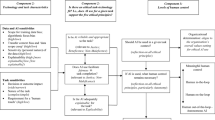Abstract
It is held that the quality of the working environment afforded to an individual critically affects the health and well-being of that individual. This has consequences for both the quality of work which that individual can actually perform, and for the quality of the society in which that individual has a place. Conceptions of a fit working environment have led to the idea of a human-centred system, and this idea is applicable to the area of knowledge-based systems (KBS). A system structure is discussed, which permits a human-centred approach to be adopted towards KBS design. It is held that the performance of such a system will generally exceed that of unaided KBS operation.
Similar content being viewed by others
References
Barr, A. and Feigenbaum, E. (1986).The Handbook of Artificial Intelligence. Addison-Wesley.
Carhart, R. E. (1979). CONGEN: An expert system aiding the structural chemist. In Michie, D. (ed.)Expert Systems in the Micro-electronic Age. Edinburgh University Press.
Lenat, D. (1983). Knowledge-based systems and AI. InArtificial Intelligence, Vol. 21. Vols 1 and 2.
Author information
Authors and Affiliations
Rights and permissions
About this article
Cite this article
Young, J. Human-centred knowledge based systems design. AI & Soc 3, 80–87 (1989). https://doi.org/10.1007/BF01891319
Issue Date:
DOI: https://doi.org/10.1007/BF01891319




